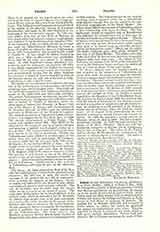

Valois, HENRI (HENRICUS VALESIUS), philologist, b. at Paris, September 10, 1603; d. at Paris, May 7, 1676. He belonged to a family of Norman gentlemen settled near Bayeux and Liseux; his grandfather, the youngest of the family, became rich in trade at Paris. Henri Valois made excellent studies with the Jesuits, first at Verdun and then at the College de Clermont at Paris, where he had Petau as professor of rhetoric. He studied law at Bourges (1622-24) and returned to Paris, where, to please his father, he practiced law against his inclination for seven years. When he regained his liberty he plunged into study, which he had never entirely abandoned. Peiresc had purchased a MS. in Cyprus containing the work of Constantine Porphyrogenitus on virtue and vice. Valois took from it numerous unedited fragments which he published in 1634: “Polybii, Diodori Siculi. Nicolai Damasceni, Dionysii Halicarn., Appiani, Alexandri, Dionis et Ioannis antiocheni excerpta”. In 1636 he edited “Ammiani Marcellini rerum gestarum lib. XVIII”, with abundant notes which illumined all the history of that period and its institutions. He succeeded in recognizing the rhythm of the phrases in the establishment of the text, at the same time making no display of his discovery. In 1650 the assembly of the French clergy commissioned him to publish the ecclesiastical historians, after Msgr. Monchal of Toulouse was compelled to resign the task. In 1659 he issued Eusebius of Caesarea‘s ecclesiastical history and biography and panegyric of Constantine, as well as Constantine’s discourse in the assembly. The text was accompanied by a new Latin translation, scholarly notes, four dissertations on Donatism, Anastasius, the Septuagint, and the Roman Martyrology. In 1668 he published Socrates and Sozomen with three books of observations on the history of St. Athanasius, on that of Paul, Bishop of Constantinople, and the sixth canon of Nicaea (against Launoy). In 1673 he completed his book with Theodoret, Evagrius, and the excerpts from Philostorgius and Theodore the Lector. In 1664 he had married a young girl who bore him seven children. At first he had only the slender means left him by his father, but later pensions from President de Mesmes, the clergy of France, Mazarin, and Louis XIV provided him with the necessary leisure and the assistance of a secretary, for his sight was never good, and as early as 1637 he ceased to have the use of his right eye. Yet he did important work, and though the MSS. at his disposal were not always the best, we cannot but admire the tact and certainty of his criticism. His temperately and sanely learned notes are excellent documents of the French learning of the seventeenth century. Valois was associated with the greatest scholars of his time, with whom however he always maintained his liberty of judgment. He wrote the funeral eulogies of Sirmond, Pierre Depuy, and Petau. He also wrote several occasional Latin poems, but to posterity he is the learned and exact editor of the Greek ecclesiastical historians.
PAUL LEJAT

